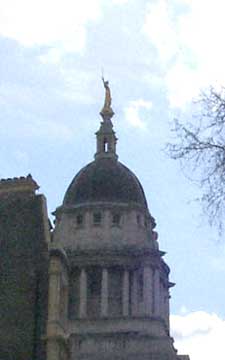 The American Connection
William Penn & Old Bailey
The Central Criminal Court, EC4
 William Penn's blind determination to change religious attitudes led to a series of skirmishes with the law and no-one was surprised when he was arrested for the umpteenth time and landed in the dock at the Old Bailey in 1670. What was unexpected, especially in an age when the business of justice was brisk and brutal, was the outcome of the case - an outcome so dramatic that a marble memorial was erected on the spot. William Penn's blind determination to change religious attitudes led to a series of skirmishes with the law and no-one was surprised when he was arrested for the umpteenth time and landed in the dock at the Old Bailey in 1670. What was unexpected, especially in an age when the business of justice was brisk and brutal, was the outcome of the case - an outcome so dramatic that a marble memorial was erected on the spot.
Charged with holding an 'unlawful, seditious and riotous assembly', Penn had in fact done nothing more than lead a service of prayer in the street. This had been his response after arriving at the Quaker meeting house he had set up in the city to find it locked against him by soldiers.
Hardly an anarchic move by today's standards, Penn's action was then taken as a serious challenge to the established church, which felt itself under threat from a number of non-conformist sects. When he came up for trial together with his friend William Mead, Penn would have expected no mercy.
Within moments of his appearance, though, Penn had staged a logical coup which changed the course of British legal history. Asked if he was guilty as charged, he replied tartly: 'The question is not whether I am guilty but whether the indictment is legal!' He then asserted that a law denying the God-given right of a man to obey his conscience was not valid.
Chaos followed and the furious judge, Sir Samuel Starling, who was also Lord Mayor of London, ordered the jury to return a guilty verdict. But Penn shouted all the louder: 'You are Englishmen. Mind your privilege. Don't give away your right!'
With astonishing courage, the jury actually did pronounce Penn and Mead not guilty. A spectacular battle of wills ensued with the judge first threatening the jurors and then incarcerating them for contempt of court.
The case caused controversy and a review was ordered after the dissidents' supporters produced a writ of habeas corpus. In a decision which toppled the old order, Chief Justice Vaughan finally upheld the right of juries to give a verdict according to their convictions.
* The large marble plaque which commemorates the trial of Penn and Mead is preserved in the original entrance lobby of the Central Criminal Court. The building stands on the site of Newgate prison, which was adjacent to the Sessions House where the trial was held.
Visitors should note that the entrance lobby of the Old Bailey is
not open to the public.

The Central Criminal Court, Old Bailey, EC4 is open from 10 a.m. until 4 p.m. Monday to Friday with an adjournment for lunch. Members of the public are usually allowed to watch the courts in session (No bags, cameras and tape recorders. No children under the age of 14.)
 St. Paul's (Central Line) St. Paul's (Central Line)
Copyright © Jan Collie 2002
Published by permission of the author.
All rights reserved. No reproduction, copy or transmission of this publication may be made without written permission.
|